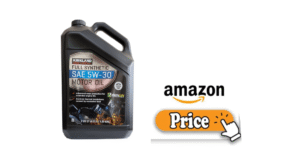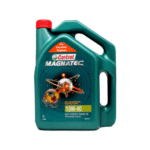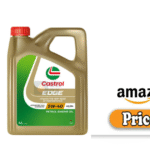When it comes to motor oil, countless brands are vying for your attention. From household names like Mobil 1 and Castrol to budget options sitting on your local auto parts store shelf, the choices can be overwhelming.
But in recent years, one name has surprised consumers with a premium performance-to-price ratio: Kirkland Signature Engine Oil. Yes, Costco’s in-house brand. At first glance, you might be skeptical. Can a wholesale brand deliver quality engine oil that competes with premium manufacturers?
In this comprehensive Kirkland Engine Oil Review, we’ll explore the oil’s composition, performance, certifications, design, and how it holds up under real-world driving conditions.
We’ll also discuss what it does right, what could be better, and whether it deserves a place in your garage.
What I Like
Let’s start with the good because there’s a lot to appreciate.
Outstanding Value
One of the biggest draws of Kirkland oil is the price. You typically get a 5-quart jug for nearly half the price of premium brands like Mobil 1, yet without sacrificing essential performance standards. For those maintaining multiple vehicles or driving high-mileage cars, this adds up fast.
Full Synthetic Formula
Kirkland Signature Engine Oil is not a synthetic blend; it’s full synthetic, offering superior protection compared to conventional or semi-synthetic oils. Full synthetic oils excel at:
- High-temperature stability
- Low-temperature flow
- Longer drain intervals
- Better engine cleanliness
API SP and Dexos1 Gen 3 Certified
This oil is not just marketing hype; it meets rigorous standards:
- API SP: The latest specification ensuring protection against low-speed pre-ignition (LSPI) and timing chain wear.
- Dexos1 Gen 3: A General Motors certification that ensures compatibility with newer engines, fuel economy, and wear resistance.
Produced by Warren Distribution
Here’s the kicker: Kirkland engine oil is manufactured by Warren Distribution, one of the largest independent lubricant producers in North America.
They also make oils for other well-known brands. You’re essentially getting name-brand quality under a private label.
Excellent User Feedback
Across automotive forums and Reddit, Kirkland oil is widely praised by both mechanics and DIYers. Many claim it performs on par with or better than leading brands at a fraction of the cost.
What Could Be Better
While the value is exceptional, Kirkland Engine Oil does have a few limitations that might give some users pause.
Limited Viscosity Options
Currently, Kirkland offers:
- 0W-20
- 5W-30
- 5W-20
While these are popular for modern cars, drivers of older vehicles or high-performance engines may require other viscosities like 10W-40 or 15W-50, which Kirkland doesn’t currently offer.
Exclusivity to Costco
You need a Costco membership to purchase Kirkland engine oil. Though it’s available online and occasionally on Amazon, it’s not as accessible as brands found at auto parts stores or gas stations.
No High Mileage Variant
As of now, Kirkland doesn’t offer a high-mileage formula specifically designed for engines with over 75,000 miles. This could be a drawback for drivers who need extra additives for seal conditioning or reduced oil burn-off.
👉🏿👉🏻 Check Latest Price and Offer at Amazon 👈🏻👈🏿
My Personal Experience With Kirkland Engine Oil
I’ve used Kirkland Signature Full Synthetic 5W-30 in my 2014 Toyota Camry and 2018 Ford F-150 for the past two years. Here’s what I’ve noticed after several oil changes and thousands of miles:
Engine Smoothness
Both vehicles ran quietly and smoothly after switching from Mobil 1 and Valvoline, respectively. Cold starts were clean, and the engines felt responsive under load.
No Burn-Off
After 6,000 miles on the Camry, the oil level remained stable, with no noticeable consumption. For a mid-mileage engine with 100k+ miles, that’s impressive.
Oil Analysis Results
I sent a sample to Blackstone Labs, and the oil showed:
- Low wear metals
- Excellent TBN (Total Base Number)
- Minimal oxidation and nitration
This confirms that Kirkland oil retains its protective qualities well past 5,000 miles.
Cost Savings
For around $24 per 2-pack of 5-quart jugs, I paid under $2.50 per quart. That’s less than half the cost of many premium oils. Over a year and multiple oil changes, the savings were significant.
My verdict? For everyday driving, Kirkland oil delivers high-end performance at a bargain price.
Design & Packaging
Kirkland’s oil packaging is functional and minimalistic, focusing more on performance specs than flashy branding.
Container
- Available in 5-quart jugs (often sold in 2-packs)
- Durable plastic with a wide-mouth design for easy pouring
- Volume markings on the side
- Secure, tamper-evident cap
Label Info
The front label is printed with:
- SAE viscosity rating
- Certifications (API SP, Dexos1 Gen 3)
- Suitable engine types
- Manufacturing details (Warren Distribution)
It’s not flashy, but it’s honest and informative.
Performance Analysis
Now, let’s get technical. How does Kirkland oil perform under pressure?
Cold Start Protection
With its full synthetic formula, Kirkland oil flows rapidly in freezing temperatures, preventing dry starts and ensuring immediate lubrication.
Thermal Stability
Under high engine temperatures, the oil maintains its viscosity, resisting breakdown and protecting against oxidation, a key cause of sludge.
Engine Cleanliness
Thanks to a robust additive package including detergents and dispersants, Kirkland oil helps keep internal components free from deposits.
Extended Drain Intervals
Backed by user reports and oil analysis, many users safely extend oil change intervals to 7,500 or even 10,000 miles, depending on driving habits and conditions.
Friction & Wear
With anti-wear additives like molybdenum and boron, Kirkland oil reduces friction between moving parts, increasing both engine performance and fuel efficiency.
Build Quality & Composition
While we can’t see inside the bottle, oil analysis and manufacturer disclosures give us a good idea of what’s inside.
Additive Breakdown (Typical for 5W-30)
- Calcium (Ca): ~2300 ppm (detergent)
- Molybdenum (Mo): ~70 ppm (anti-friction)
- Boron (B): ~180 ppm (detergent/anti-wear)
- Zinc (Zn) & Phosphorus (P): ~800 ppm each (ZDDP anti-wear compound)
These numbers align with premium formulations, confirming the quality behind the product.
Alternative Options to Consider
If you’re shopping around, here are a few alternatives that compete with or complement Kirkland engine oil:
1. Mobil 1 Advanced Full Synthetic
- Higher price, but broader range of viscosities
- Superior performance under extreme conditions
2. Valvoline Advanced Full Synthetic
- Known for a strong detergent system
- Trusted brand with good cold and high-heat protection
3. AmazonBasics Full Synthetic
- Very similar to Kirkland in performance and price
- Often rebranded Warren Distribution oil as well.
4. Pennzoil Ultra Platinum
- Uses natural gas-based oil (PurePlus Technology)
- Great for turbocharged engines and performance driving
Read More: Valvoline vs Castrol: The Ultimate Showdown of Motor Oil Giants
Final Thought: Is Kirkland Engine Oil Worth It?
Yes—100%.
Kirkland Signature Full Synthetic Engine Oil is one of the best-kept secrets in automotive maintenance. For a fraction of the cost of premium brands, you get a high-quality, fully certified oil that performs exceptionally well in real-world conditions.
Whether you’re a DIY mechanic or just want to stretch your budget without sacrificing engine health, this oil is a no-brainer. The fact that it’s produced by a reputable manufacturer like Warren Distribution just seals the deal.
Final Rating: ★★★★☆ (4.8/5)
Best For: Daily drivers, commuters, fleet managers, budget-conscious car owners
FAQs: Kirkland Engine Oil Review
Q1: Who makes Kirkland engine oil?
Kirkland engine oil is manufactured by Warren Distribution, a trusted name that also produces oils for many major retail brands.
Q2: Is Kirkland engine oil good for high-mileage vehicles?
While it performs well, Kirkland doesn’t currently offer a high-mileage-specific version. For older engines, consider adding a seal conditioner or using a different oil designed for high-mileage engines.
Q3: How often should I change Kirkland synthetic oil?
Depending on driving conditions, you can go 7,500–10,000 miles between oil changes. Always check your vehicle’s owner’s manual and consider a used oil analysis if extending intervals.
Q4: Does KirklanOilil meet Dexos1 Gen 3 certification?
Yes, all current Kirkland full synthetic oils are Dexos1 Gen 3 approved, meaning they meet modern engine requirements, including turbocharged and direct-injection engines.
Q5: Can I use Kirkland oil in a turbocharged engine?
Yes. Its full synthetic base and API SP/Dexos1 Gen 3 rating make it safe for turbocharged engines, which often demand better heat resistance and deposit control.
Q6: What’s the shelf life of Kirkland engine oil?
Unopened, it has a shelf life of up to 5 years if stored in a cool, dry place. Opened containers should be used within a year.




